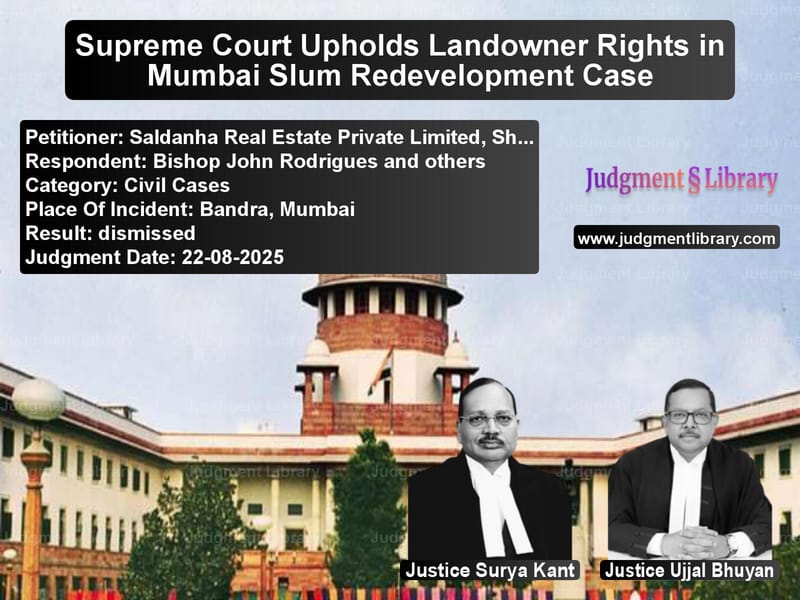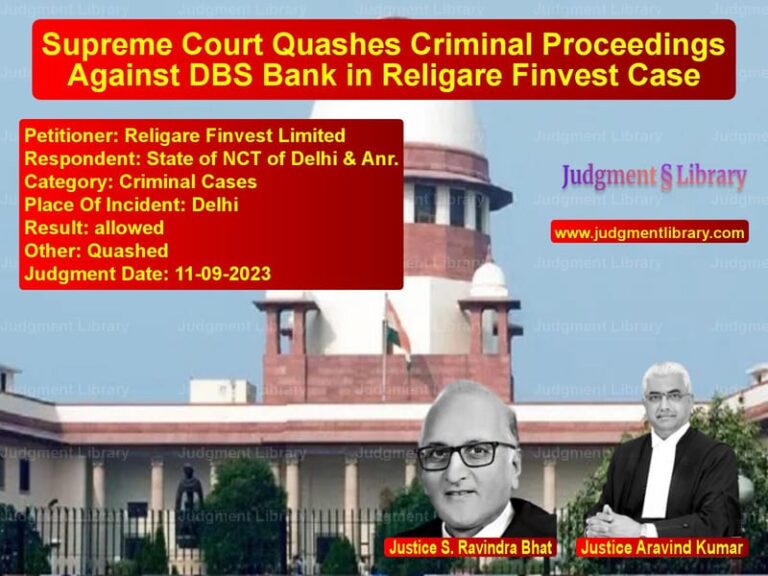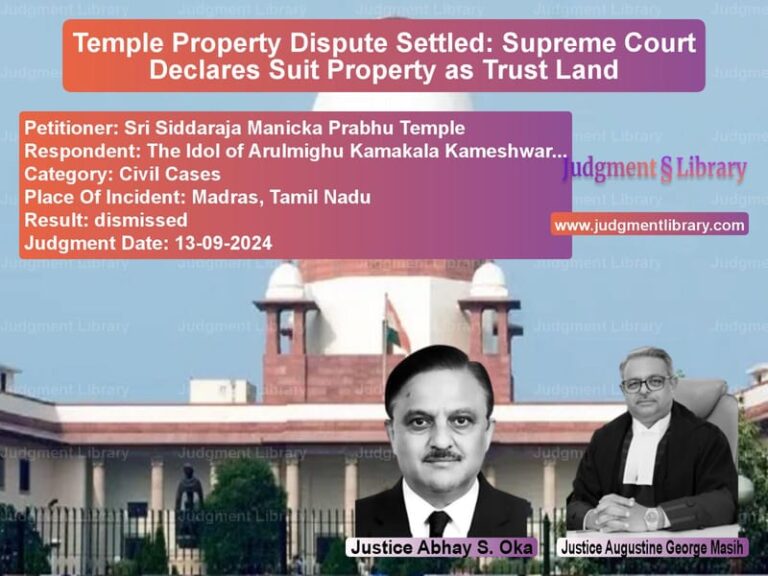Supreme Court Upholds Landowner Rights in Mumbai Slum Redevelopment Case
In a significant ruling that reinforces property rights in slum rehabilitation projects, the Supreme Court of India has delivered a landmark judgment protecting landowners from arbitrary acquisition by developers and authorities. The case centered around a contentious dispute over prime land in Bandra, Mumbai, where a church trust’s property was targeted for acquisition under slum redevelopment provisions.
The legal battle involved the Basilica of Our Lady of the Mount (Church Trust) fighting to protect its 1,596.40 square meter property from being acquired through what the court ultimately determined was a coordinated attempt by a private developer to wrest control of the valuable land. The judgment provides crucial clarity on the rights of landowners in slum rehabilitation areas and establishes important safeguards against misuse of statutory powers.
The Legal Framework and 2018 Amendments
The case required the court to interpret the Maharashtra Slum Areas (Improvement, Clearance and Redevelopment) Act, 1971, particularly focusing on the changes introduced through the 2018 Amendment. The court noted that despite legislative changes, the fundamental rights of landowners remained protected. Justice Surya Kant, writing for the bench, observed that “no attempt has been made to remove or dilute the preferential right of the landowner to redevelop an SR Area.”
The court emphasized that the 2018 Amendment had actually strengthened landowners’ rights by explicitly including the term ‘owner’ in key provisions alongside ‘landholders’ and ‘occupants.’ This legislative recognition of distinct rights enjoyed by property owners formed the foundation of the court’s analysis.
The Core Legal Dispute
The heart of the legal controversy revolved around whether the Slum Rehabilitation Authority (SRA) was required to issue a specific notice to the landowner inviting them to submit a redevelopment proposal before initiating acquisition proceedings. The appellants, including the proposed housing society and the developer Saldanha Real Estate, argued that the 2018 Amendment had eliminated this requirement.
Mr. Shyam Divan, learned Senior Counsel representing Kadeshwari Society, contended that “the mandatory notice and hearings before a Section 3C(1) Declaration eliminate the need for another notice under Section 13.” He further argued that “the 120-day time limit further indicates a shift in legislative policy, where the onus of submitting a proposal is placed on the landowner.”
However, the court rejected these arguments, drawing a clear distinction between the different stages of the slum rehabilitation process. The bench held that “the issuance of a notice under Section 3C is meant to accord hearing to a landowner and invite objections, if any, against declaration as an SR Area. By contrast, the purpose of a specific notice under Section 13 is to invite and enable the owner to initiate redevelopment.”
Court’s Reasoning on the Notice Requirement
The Supreme Court provided compelling reasons for maintaining the requirement of a specific notice to landowners. The judgment noted that “considering the practical realities of preparing an SR Scheme as well as the potentially drastic consequences of not submitting the same, held that it would not be feasible for the owner to file the scheme without being invited to do so.”
The court further clarified that the 120-day time limit for submitting redevelopment proposals would only commence after the landowner received proper notice and invitation. “The stipulated time-limit would come into effect after the owner is notified and invited to redevelop the SR Area, whereupon they must come forward within the time-ceiling,” the court stated.
This interpretation ensures that landowners have a meaningful opportunity to exercise their preferential development rights rather than being caught unaware by statutory deadlines.
Questionable Conduct and Mala Fide Intentions
Perhaps the most striking aspect of the judgment is the court’s strong condemnation of the conduct exhibited by the private developer and the SRA. The bench found overwhelming evidence of coordinated efforts to deprive the Church Trust of its property rights.
The court highlighted a particularly revealing letter from Saldanha to the Church Trust, which contained what the court described as a “veiled threat aimed at pressuring the Trust into relinquishing its property.” The letter stated: “The members of Pawar Chawl have been paying the municipal taxes and water bills since inception and are in a position to make a claim that they are in adverse possession of the land or even approach the CEO, SRA to acquire this portion of land declared slum and occupied by them under the SRA rules and regulations with regard to acquisition as per the legal advice given to them. If implemented, it would take a maximum time of three months to acquire or claim adverse possession.”
The court observed that “Saldanha’s actions suggest a calculated attempt to wrest the Subject Land from the Church Trust, along with over 380 sq. m. of adjoining BMC land, by exploiting the markedly low acquisition rates for commercial gain.”
SRA’s Complicity and Failure of Duty
The judgment was particularly critical of the Slum Rehabilitation Authority’s conduct, noting that “the SRA and its functionaries have approached this case is even more shocking. The record reveals a dire lack of application of mind or any objective and coherent reasoning in the decisions of the SRA.”
The court identified multiple failures by the SRA, including its refusal to issue the mandatory notice to the Church Trust, its disregard for the Trust’s redevelopment proposal, and its unusual haste in processing the acquisition during COVID-19 lockdowns. The bench noted that “the SRA did not consider that the Section 3C(1) Declaration dated 29.12.2020 was itself under challenge in Application No. 20 of 2021 before the AGRC.”
In a strongly worded conclusion, the court stated that “throughout this case, the SRA and its CEO appear to have abandoned their public duty to uphold the Rule of Law and protect the rights of the landowner. On the contrary, the facts reveal a prejudiced attempt by the SRA to undermine legislative and judicial efforts and hand over the Subject Land and the benefits of its rehabilitation to Saldanha.”
Broader Implications and Safeguards
The judgment highlights the vulnerability of landowners in slum rehabilitation processes and the need for robust safeguards. The court observed that “the Slums Act, while providing wholesome protection to slum dwellers and their homes and livelihood, does not give such express protection to the interests of the owner of the land. The ensuing vacuum, as we have seen in these appeals, allows opportunistic developers to swoop in, exploit the circumstances of the poor slum dwellers, manipulate the hand-in-glove authorities, and enrich themselves off the helpless owner’s land.”
This recognition of systemic vulnerabilities underscores the importance of the court’s intervention in establishing clear procedural requirements that protect landowners’ rights.
Final Ruling and Directions
The Supreme Court dismissed all appeals and upheld the Bombay High Court’s judgment quashing the acquisition proceedings. The court granted the Church Trust 120 days to submit a proper slum rehabilitation scheme for the property and directed the SRA to provide full support for the process.
The bench concluded that “the High Court has rightly nipped these proceedings in the bud, protecting the statutory rights and interests of the Church Trust over the Subject Land and preventing the Appellants from illegally grabbing it.”
This judgment serves as a significant precedent for property rights in urban redevelopment contexts, establishing that procedural safeguards for landowners cannot be circumvented through collusion between developers and authorities. The ruling reinforces that slum rehabilitation schemes must balance the interests of all stakeholders, including property owners who maintain preferential rights to develop their own land.
Petitioner Name: Saldanha Real Estate Private Limited, Shri Kadeshwari CHS Ltd (proposed), The Slum Rehabilitation Authority.Respondent Name: Bishop John Rodrigues and others.Judgment By: Justice Surya Kant, Justice Ujjal Bhuyan.Place Of Incident: Bandra, Mumbai.Judgment Date: 22-08-2025.Result: dismissed.
Don’t miss out on the full details! Download the complete judgment in PDF format below and gain valuable insights instantly!
Download Judgment: saldanha-real-estate-vs-bishop-john-rodrigue-supreme-court-of-india-judgment-dated-22-08-2025.pdf
Directly Download Judgment: Directly download this Judgment
See all petitions in Property Disputes
See all petitions in Judgment by Surya Kant
See all petitions in Judgment by Ujjal Bhuyan
See all petitions in dismissed
See all petitions in supreme court of India judgments August 2025
See all petitions in 2025 judgments
See all posts in Civil Cases Category
See all allowed petitions in Civil Cases Category
See all Dismissed petitions in Civil Cases Category
See all partially allowed petitions in Civil Cases Category







